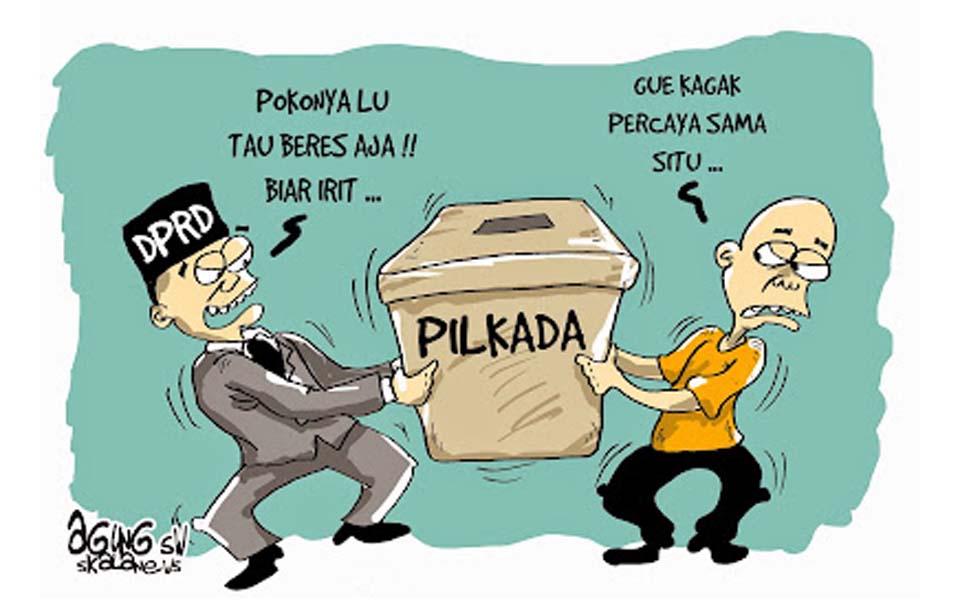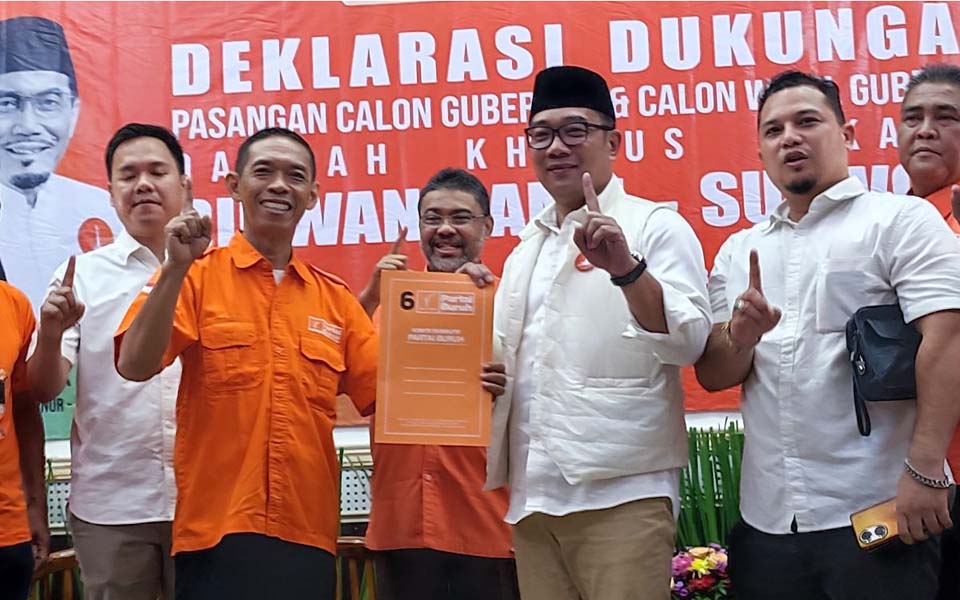Haris Prabowo – The total number of people who used their right to vote in the December 9 election of regional heads was low in several parts of the country. In the context of Indonesian politics, those who do not vote – regardless of the motivation and reasons – can be classified as golongan putih or golput.
A minimal level of public participation also occurred in areas where elections involved big-name candidates.
Let's look at Depok, West Java, which in recent years has been controlled by the Islamic based Justice and Prosperity Party (PKS). The final result of the Depok mayoral election, which was counted on December 16, placed the incumbents Mohammad Idris-Imam Budi Hartono first as the ticket with the most votes, 414,655. Their rival meanwhile, the Pradi Supriatna-Afifah Alia ticket, only received 332,233 votes.
The total number of eligible voters (DPT) in Depok is 1,229,362, meaning that together the two electoral tickets only received 746,888 votes or only 60.75 percent of the electorate vote. The Idris-Hartono ticket only garnered 33.73 percent while Supriatna and Alia only got 27.02 percent.
Based on a copy of the Depot City General Elections Commission (KPUD) office vote recapitalisation received by Tirto, at least 451,625 people did not use their right to vote. Not only that, 29,391 ballot papers were invalid. In total, 484,058 votes were not used representing 36.74 percent of the DPT.
Thus the number of votes which were not used was more than number of votes received by the winner.
Let's look at South Tangerang. The candidates taking part in the contest in this area are close to the political elite, so the mayoral election in South Tangerang has often been referred to as a contest between dynasties: Defense Minister Prabowo Subianto's niece Rahayu Saraswati Djojohadikusumo, former Banten governor Ratu Atut Chosiyah family member and Golkar Party politician Pilar Saga Ichsan and Vice President Ma'ruf Amin's daughter Siti Nur Azizah.
The final result, which was counted on December 16, placed the Benyamin Davnie-Pilar Saga Ichsan ticket first with 235,656 votes. The Muhammad-Rahayu Saraswati ticket meanwhile was in second place with 204,930 votes followed by Siti Nur Azizah and Ruhamaben in third place with 135,122 votes.
The total DPT for South Tangerang is 976,019. This means the Davnie-Ichsan ticket only garnered 24.14 percent of the vote, the Muhammad-Saraswati ticket 21 percent and the Azizah-Ruhamaben ticket 13.84 percent. The total number of votes for the three electoral tickets was 575,708 or 58.99 percent. A total of 400,311 people did not vote or their ballot papers were damaged and therefore invalid amounting to 41.01 percent of the DPT.
Like Depok, the golput "vote" was higher – by a difference of 164,000 votes – than those received by the winners. Once again, it was golput that actually won the South Tangerang mayoral election.
Then there was the East Timor provincial capital of Surabaya, which is known as a traditional base for the current ruling party, the Indonesian Democratic Party of Struggle (PDI-P). The final vote, which was counted on December 16, placed the Ery Cahyadi-Armudji ticket in first place with 569,715 votes followed by the Machfud-Mujiaman ticket with 426,946 votes. Ery Cahyadi is the assistant to the current Surabaya mayor, Tri Rismaharini.
The DPT for the city is 2,089,027 while the total number of votes received by the two electoral tickets was only 996,679. This means that around 1,092,348 people did not vote or their ballot papers were damaged. The total golput vote was far more – by a difference of 522,000 votes – than the votes received by the winning ticket.
Finally, we'll go to the city where President Joko "Jokowi" Widodo's son-in-law won the election: Medan city in North Sumatra. Bobby Nasution, who was paired up with Aulia Rachman, received 393,533 votes followed by the Akhyar Nasution-Salman Alfarisi ticket with just 342,480 votes.
If compared with the DPT of 1,601,001 eligible voters, Nasution and Rachman only garnered 24.58 percent of the vote while the Nasution-Alfarisi ticket got 21.39 percent. The total number of votes for the two electoral tickets was only 736,013 or 45.97 percent.
Some 864,988 or 54.03 percent of people did not vote or their ballot papers were damaged. This means that the golput vote was far more than the votes received by the winning Nasution-Alfarisi ticket by a margin of around 471,000 votes.
Slap in the face for incumbents, dynasties
Al-Azhar Indonesia University political science lecturer Ujang Komaruddin says that the high golput vote proves that people were reluctant to vote. This was a form of protest and a reflection of disappointment with the government "because it pushed the election through in the midst of the [corona] pandemic".
"And also because the candidates presented were not ones that the ordinary people had placed any hope in, but were the hopes of the families of the elite", said Komaruddin when contacted by Tirto on Thursday December 17. "This is a big slap in the face for the regional candidate heads who were elected".
Electoral researcher Ikhsan Maulana from the Constitution and Democracy (Kode) Initiative says that the high rate of golput was because from the start the public opposed holding an election in the midst of the Covid-19 pandemic. Holding the elections in the midst of the pandemic was clearly ridden with the political interests of those in power. "The public health aspect was resigned to second place. So it wasn't wrong if the public chose to golput", he said.
The other factor, according to Maulana, was the public's apathy towards formal democratic processes such as elections. This has emerged both before and during the pandemic. This apathy has emerged because of the many government policies which were seen as being at odds with the wishes of the ordinary people, the climax being the recently enacted Omnibus Law on Job Creation.
"The reasons for golput or apathy or consciously choosing not to vote can be said to be a punishment directed against the political parties and candidates put forward because of factors such as disappointment with government policies", he said.
Notes
Golput, Golongan Putih or White Group. The term first emerged as a campaign by students in the 1971 elections and derives its name from marking the white section of the ballot paper rather than a party symbol or candidate's picture thereby making the vote invalid. In recent years the term has broadened to include not just intentionally casting an invalid vote but also vote abstention.
[Translated by James Balowski. The original title of the article was "Golput Unggul di Pilkada, Dinasti & Petahana Tak Mampu Melawannya".]
Source: https://tirto.id/golput-unggul-di-pilkada-dinasti-petahana-tak-mampu-melawannya-f8kn















